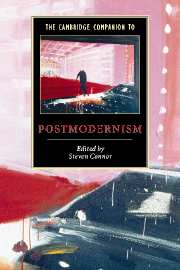Book contents
- Frontmatter
- Introduction
- 1 Postmodernism and philosophy
- 2 Postmodernism and film
- 3 Postmodernism and literature
- 4 Postmodernism and art
- 5 Postmodernism and performance
- 6 Postmodernism and space
- 7 Science, technology, and postmodernism
- 8 Postmodernism and post-religion
- 9 Postmodernism and ethics against the metaphysics of comprehension
- 10 Law and justice in postmodernity
- Further reading
- Index
- Sereis List
Introduction
Published online by Cambridge University Press: 28 May 2006
- Frontmatter
- Introduction
- 1 Postmodernism and philosophy
- 2 Postmodernism and film
- 3 Postmodernism and literature
- 4 Postmodernism and art
- 5 Postmodernism and performance
- 6 Postmodernism and space
- 7 Science, technology, and postmodernism
- 8 Postmodernism and post-religion
- 9 Postmodernism and ethics against the metaphysics of comprehension
- 10 Law and justice in postmodernity
- Further reading
- Index
- Sereis List
Summary
“Finished, it's finished, nearly finished, it must be nearly finished,” Clov promises himself at the beginning of Beckett's Endgame. Surely, the first thing to be said about postmodernism, at this hour, after three decades of furious business and ringing tills, is that it must be nearly at an end. But in chess, from which Beckett's play takes its title, the endgame is not the end of the game, but the game of ending that forms part of it and may be looked towards from the beginning. Playing the game may become identical with playing the game out. There are strategies for managing the end of the game, including ways of deferring that ending, which come not after the game but in the thick of it. One is compelled to begin almost any synoptic account of postmodernism with such sunset thoughts, even as, in the very midst of one's good riddance, one senses that the sweet sorrow of taking leave of postmodernism may be prolonged for some time yet.
- Type
- Chapter
- Information
- The Cambridge Companion to Postmodernism , pp. 1 - 19Publisher: Cambridge University PressPrint publication year: 2004
- 5
- Cited by



